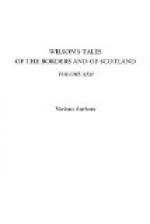“And what he’ll say, my letty?” inquired John in a low and gentle tone, and stopping to catch Lady Rae’s communication.
“Not much that is quite satisfactory, John. He speaks in a strange style, but I think there is ground of hope. He did not altogether refuse the prayer of my petition, but bade me call upon him again to-morrow.”
John looked grave, but made no reply. His lady walked on, and he followed at a respectful distance.
The former now directed her steps to a locality in the city with which she was but too familiar, and which she had had occasion of late but too often to frequent. This was the Tolbooth—the place of her husband’s confinement.
On reaching the outer entrance to the jail, the low half-door, thickly studded with huge-headed nails, by which it was temporarily secured during the day, was immediately thrown open for her admission by the turnkey—a little crusty-looking personage in a fur cap—who had been leaning over it, listlessly looking around him, on her ladyship’s approach. As the latter entered the prison door, the former stood to one side, doffed his little fur cap, and respectfully wished her ladyship a good morning.
“How are you to-day, James?” said Lady Rae in kindly tones; “and how is my lord?”
“Quite well, my lady, quite well,” replied the little turnkey, extremely proud, seemingly, of the condescension of her ladyship. The latter passed on, and commenced threading her way through the tortuous but well-known passages which led to her husband’s prison-room. John M’Kay followed his mistress into the jail, previously leaving his arms at the door—a condition to which he had always to submit before gaining admission. Having denuded himself of his weapons, John also passed on, but not before he had shaken his fist ominously in the face of the little jailer. This was John’s constant practice every time he entered the prison; and, simple as the act was, it had a good deal of meaning. It meant, in the first place, that John associated the misfortune of his master’s confinement with the little turnkey’s employment; that he considered him as aiding and abetting in the same. It further meant, that if it were not for one thing more than another, or, as John himself would have expressed it, “for todder things more nor ones,” he would have brought his Lochaber axe and the turnkey’s head into more intimate contact.
In the meantime, Lady Rae having ascended several flights of dark and narrow stairs, and traversed several passages of a similar description, had arrived at a particular door, on either side of which stood a grenadier, with shouldered musket and bayonet fixed. They were the guards placed upon her husband, who occupied the apartment which they sentinelled.
The soldiers, who had orders to admit her ladyship and attendant to the prisoner at any time between the hours of nine in the morning and seven at night, offered no hindrance to her approaching the door and rapping for admittance. This she now did; and the “Who’s there?” of the captive was replied to in a powerfully Celtic accent by John M’Kay, with—“My Letty Rae, my lort.” The door instantly flew open, and its inmate came forth, with a smiling and delighted countenance, to receive his beautiful and faithful wife.




